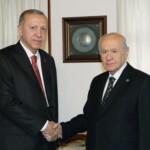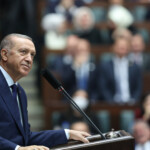“It turned out that many of us once again underestimated Erdoğan’s political skills and ability to read and control the situation.”
The day after Turkey’s historic May 14 elections, MIT Economist Daron Acemoglu posted his analysis of what happened on Twitter. We found the thread worth reprinting in full below.
***
It’s hard not to be disappointed with the outcome. Erdogan is close to a victory, even if there will most likely be a runoff. This is worse than most of us expected.
To make sense of it, it is important to first recognize that the Turkish electorate has become very nationalistic. The far-right MHP, allied with Erdogan, received 10% of the vote, despite the fact that nationalist votes were split between Erdogan, the MHP, the Iyi Parti and others. The president and his allies completely controlled TV and print media and used it to fan the flames of nationalism, esp. with regard to allegations of the opposition being in cahoots with Kurdish separatists. Combined with Kilicdaroglu’s Alevi identity, this may have been effective.
Economic mismanagement and endemic corruption did not have as wide an effect as many (including myself) thought. These mattered in metropolitan areas, but not in places where the AKP built and used its patronage networks. Most jarringly, the AKP did very well in major earthquake areas. This is where its patronage network mattered a lot. Years of municipal and higher-level corruption were responsible for the severity of the earthquake’s effects and its number and deaths. But promises of housing and jobs worked.
It turned out that many of us once again underestimated Erdoğan’s political skills and ability to read and control the situation. Media dominance matters, but it goes beyond that. This part is bad news for democracies all around the world, not just in Turkey.
All of this is bad news for the future of Turkish institutions. The judiciary and law enforcement have lost all independence. Combined with powerful corruption networks (centered on the construction industry) and the situation of the media, this is bad news indeed. We also have to recognize and learn from the electoral success of the machine that the AKP built. This is part of democratic functioning, but it isn’t truly democratic, because of repression, media control, and intimidation of opponents and opposition (some of whom are in jail).
But for democracy, things may be even worse. Though the AKP has lost parliamentary seats, the opposition is now weaker and more fragmented – all the more so because CHP gave away several parliamentary seats to allies in order to keep the coalition together (which may have been a mistake).
Worse news for the country, the economy is in shatters. The AKP has run down reserves and hugely expanded its promises and spending to bolster up its patronage network. I don’t know how the country can stave off economic collapse. One concern was that the economic crisis would arrive under an opposition government (which did not seem to fully understand the severity of the situation, in my opinion) and would tarnish the reputation of the CHP and others. Now the AKP, who broke it, will have to try to fix the economy.
Unfortunately, I don’t see any sign that the AKP will be able to deal with the crisis either. There are few qualified people to take this task on board, and corruption and mismanagement are likely to continue. I am worried for the future of the economy and democracy.
The views and opinions expressed above are the author’s and do not represent those of the Free Turkish Press.


